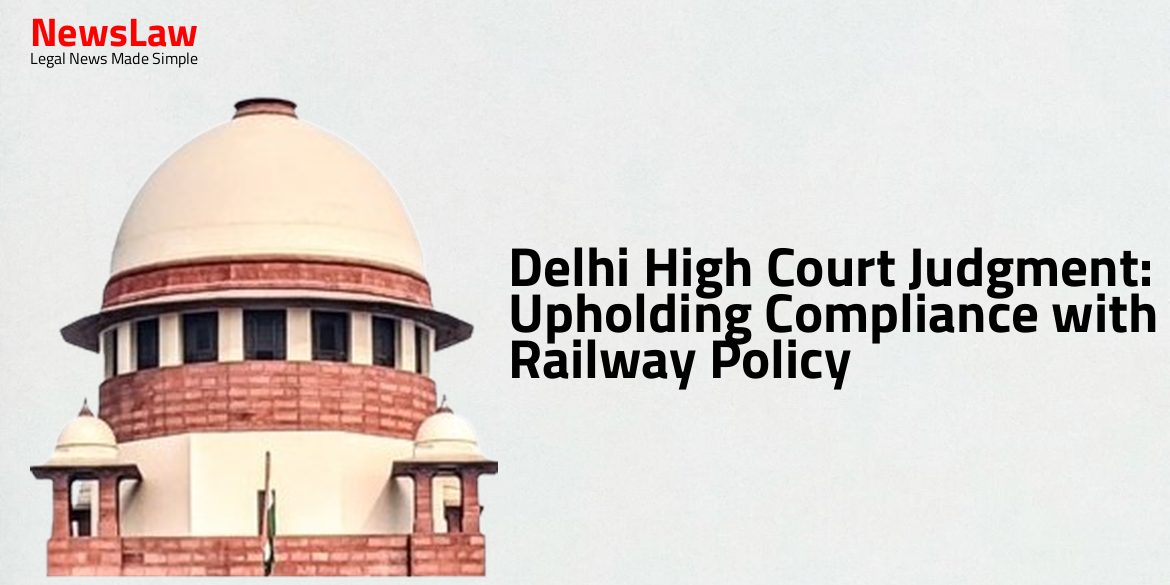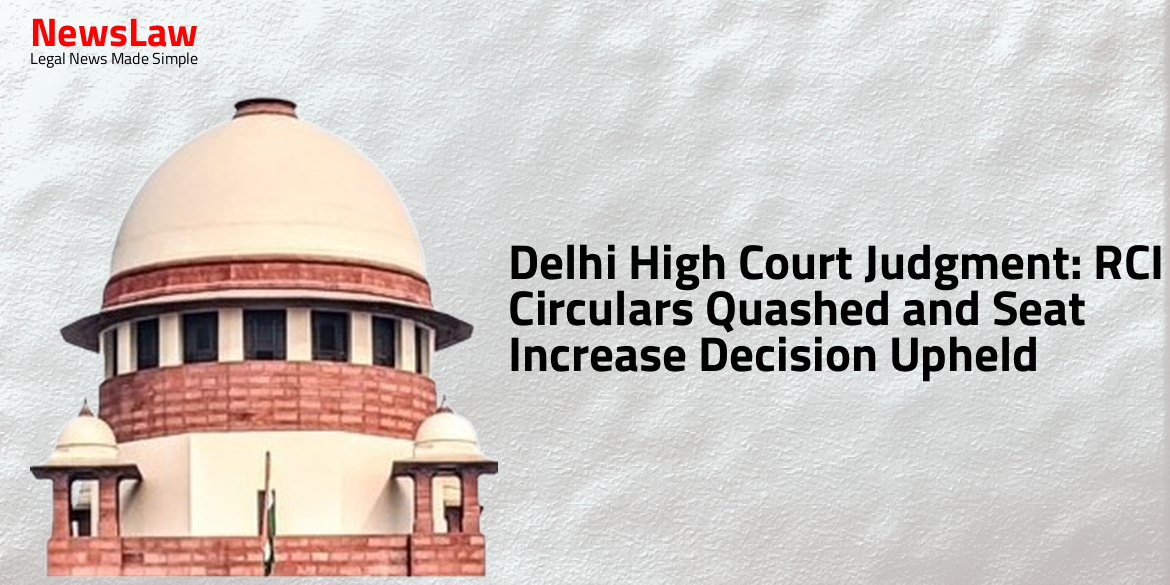In a recent judgment by the Delhi High Court, the compliance with the Railway Policy was upheld, impacting the rights and obligations of the parties involved. This case delves into the intricate legal aspects surrounding the conversion of stalls/trolleys to Multi Purpose Stalls (MPS) at various railway stations. Stay informed about the details and significance of this ruling in the realm of administrative and contractual agreements.
Facts
- The tenure of the petitioners’ licenses was originally set for five years from the date of conversion of stall/trolley until 21.12.2022.
- Due to the Covid-19 lockdown being classified as a force majeure event, the tenure was extended by 68 days until 27.02.2023.
- The Master License Agreements and extension letters have been challenged in the petitions.
- Clause 5 and Clause 11 of the 2017 Policy by the Railway Board in Delhi have been contested by the petitioners.
- The petitioners were directed to vacate their MPS by 27.02.2023 as per the letters from the respondent.
- Petitioner No.1 operates three MPS at Bareilly Railway Station.
- Petitioner No. 2 runs an MPS at Moradabad Railway Station.
- Petitioner No.3 operates an MPS at Haridwar Railway Station.
- The petitioners were initially running miscellaneous stalls/trolleys under Commercial Circular No. 96 of 2007 and were later compelled to convert to MPS under the 2017 Policy by Northern Railway.
- Specific Master License Agreements were subsequently signed between the petitioners and the respondent to formalize the license arrangement.
Arguments
- The petitioners argue that the 68-day contract extension due to Covid-19 is arbitrary compared to longer extensions granted to other MPS units in different railway zones.
- They seek an extension of the license period proportional to the reduction in fees following decreased foot traffic at railway stations post-lockdown.
- The petitioners challenge Clause 5 of the 2017 Policy, claiming it violates Article 14, 19(1)(g), and 21 by taking away their right to license renewal and forcing them to compete against big companies.
- They request a writ of mandamus to compel the relevant zonal railways to renew and extend their licenses.
- The petitioners argue for a renewal based on the South Central Railways judgment, stating that the 2017 Policy should not prevent license renewal.
- They contend that they were coerced into converting their stalls to MPS units and that the new policy prevents monopoly, offering livelihood opportunities to others during re-tendering.
- The petitioners expect to sustain their business operations and renew their licenses, placing reliance on various legal precedents.
- The learned senior counsel emphasizes the expectation of license renewal based on the balance between the right to livelihood and equal opportunity as per the 2017 Policy.
- The petitioner signed a contract for a non-renewable five-year period
- The petitioner cannot claim ignorance as the contract clearly stated its terms
- The petitioner enjoyed the benefits of the contract for five years
- The court rejected reliance on a Supreme Court judgment not applicable to the petitioner’s case
- The contract in question was under a different policy than the one the petitioner tried to refer to
Analysis
- Clause 9 of the 2017 Policy provides a 33% sub-quota for women in allotment of each reserved category of MPS at all stations.
- The 2017 Policy safeguards the rights of marginalized minorities and weaker sections of society.
- The petitioners voluntarily converted their stalls/trolleys to MPS based on the Railway Board’s scheme.
- The petitioners do not have an indefeasible right of renewal under the Easements Act or the 2017 Policy.
- The Force Majeure clause was implemented for catering and vending contracts during the lockdown period.
- The petitioners’ claim for renewal of their licenses lacks merit as the 2017 Policy explicitly states no extension or renewal of MPS units.
- The petitioners are subject to the terms of the 2017 Policy and can participate in a fresh bid if eligible.
- The Supreme Court precedent regarding license renewals under the 2010 Catering Policy is not applicable to the present case.
- The petitioners cannot claim a permanent right to seek extension or renewal of their licenses beyond the 2017 Policy terms.
- The challenge to Clause 5 and 11 of the 2017 Policy is deemed unsustainable.
- The extension of the license period due to COVID-19 was based on a force majeure event and not arbitrary.
- The letter issued by the Railway Board outlined the implementation of Force Majeure for catering and vending contracts.
- The courts do not have the authority to legislate on policy decisions made by the executive branch for better administration.
- The sub-quota provisions in the 2017 Policy aim to rectify disparities in opportunities within marginalized groups.
- The specific part of the judgment (STA) is discussed in points below:
- The content focuses on the relevance and key elements of STA in the judgment.
- It emphasizes the importance of understanding and analyzing STA in relation to the case.
- The points within the STA section shed light on critical aspects of the case’s legal framework.
- The discussion within this section provides a deeper insight into the legal perspectives considered by the court.
- Courts have the jurisdiction to declare the law as unconstitutional.
- The Karnataka High Court rejected a challenge to the 2017 Policy in the case of Gulfeeza Begum v. Union of India.
- The court emphasized that a breach or threat to breach a fundamental, statutory, or enforceable equitable right is necessary for issuing a writ of Mandamus.
- Judicial review of a policy decision is different from issuing a mandamus to frame policy in a specific manner.
- The courts interpret laws involving a creative process.
- Legitimate expectation does not always entitle the expectant to relief; other factors can negate it.
- No public body under the constitutional system is vested with arbitrary powers, as highlighted in the case of Ramana Dayaram Shetty v. International Airport Authority of India.
- A writ of Mandamus cannot be issued to direct the enactment of laws or framing of rules.
- Mandamus is for enforcement of a fundamental or statutory right, or related duty.
- Individual license agreements and the 2017 Policy both contain an arbitration clause.
- The arbitration clause can be invoked if the petitioners are aggrieved by the insufficiency of extension due to the Covid-19 situation or if they wish to claim damages.
- Petitioners are at liberty to initiate appropriate proceedings through the arbitration clause.
Decision
- Existing stalls/trolleys can be converted into Multi Purpose Stalls (MPS) as per the 2017 policy.
- The petitioners opted to convert their existing stalls/trolleys to MPS for a tenure of 5 years.
- After expiry of current agreement, new MPS space will be allotted by Zonal Railways.
- Existing licensees can convert their stalls to MPS by paying the quoted License Fee.
- The current batch of petitions is held to be maintainable and disposed of accordingly.
- Petitioners have requested conversion of their stalls/trolleys to MPS and agreed to pay revised fees.
- The petitions are dismissed, but a 3-month transition period is granted for vacating the stalls.
Case Title: RUMANA SURESH SHAH Vs. UNION OF INDIA & ORS. (2024:DHC:4452)
Case Number: W.P.(C)-6574/2024



